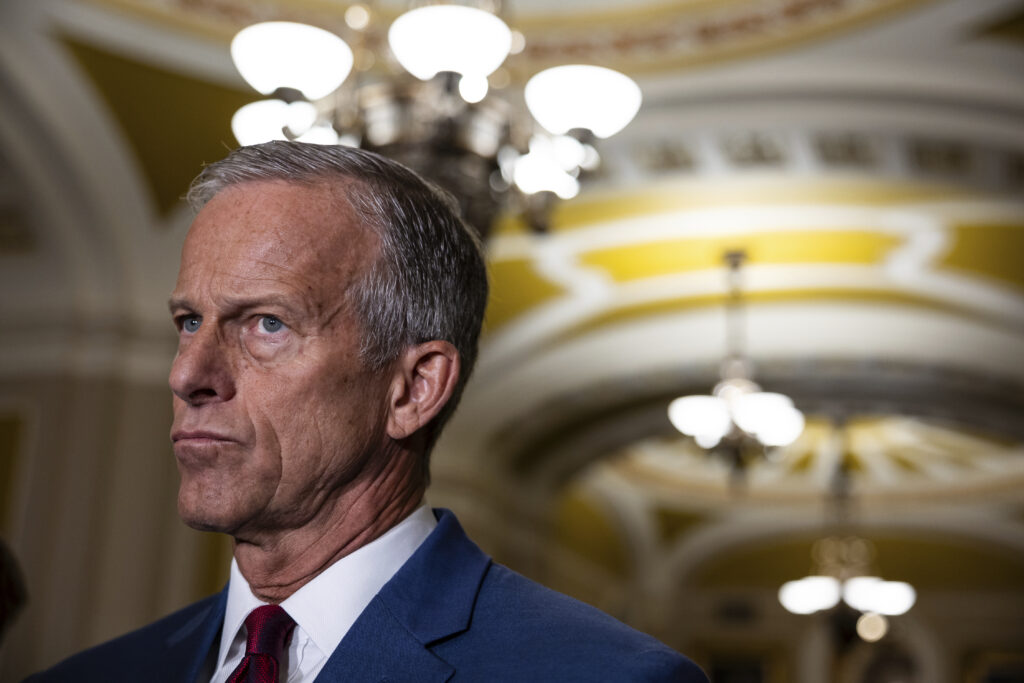The shutdown showdown is officially on.
The Senate rejected dueling short-term government funding proposals Friday afternoon, leaving no clear off-ramp before the fiscal year ends and agencies shut down at midnight Sept. 30.
Despite the looming cliff, neither side appears ready to blink, and lawmakers are set to spend at least the next nine days back home. House Republicans are not set to return until after a shutdown is already underway, and the Senate is unlikely to vote again until less than 48 hours before the deadline.
Senate Majority Leader John Thune warned that the only live option on the table for Democrats is to approve the House-passed bill favored by Republicans.
“Looks to me like it’s this or a shutdown,” he said.
Republicans rejected a Democratic counterproposal in an 47-45 vote on Friday that would link government funding through Oct. 31 with health care policies and limits on President Donald Trump’s ability to withhold money Congress has approved.
Democrats plan to use the vote to attack Republicans for opposing the restoration of Medicaid cuts made in their “big, beautiful bill” they passed in July as well as the extension of health insurance subsidies that expire later this year. This, they believe, will galvanize public opinion and pressure President Donald Trump and GOP lawmakers to cave.
“Our Republican colleagues seem to think Americans are happy with the direction of this country,” Senate Minority Leader Chuck Schumer said Friday. “They’re voting like they think the status quo is good enough, even though they’ve heard from so many of their constituents the fear of hospitals closing, of health care being diminished, of premiums going way up, hundreds of dollars each month.”
Democrats then rejected the GOP stopgap in an 48-44 vote after it passed the House earlier Friday morning. Only one Democrat, Sen. John Fetterman of Pennsylvania, voted for the bill — well short of the 10 who helped avert the last shutdown standoff by supporting a GOP-written bill in March. Two Republicans, Lisa Murkowski of Alaska and Rand Paul of Kentucky, also voted against it.
Democrats had telegraphed in advance of Friday’s vote that they would oppose the GOP bill because Republicans had not responded to entreaties from Schumer and House Minority Leader Hakeem Jeffries to hold a bipartisan summit meeting to discuss government funding.
But Republicans appear to be perfectly comfortable blaming Democrats — and particularly Schumer — for a funding lapse, as the Democratic leader faces pressure on his side of the aisle to put up a fight against Trump and congressional Republicans after caving in March.
“My guess is Chuck Schumer is too afraid of his own shadow and will vote to shut the government down on the 30th,” Sen. Eric Schmitt (R-Mo.) told reporters. “So whatever we do between here and there, you know, it’ll probably be a little bit fluid. But at the end of the day, he’s going to have a decision to make.”
House members were advised Friday that planned session days for Sept. 29 and 30 were cancelled, meaning the House would not be able to act quickly even if a compromise were reached in the Senate.
“If Senate Democrats insist on a Schumer Shutdown of the federal government, Members should be prepared to return to DC,” a Republican leadership advisory said.
Thune said this week that he was willing to meet with Schumer. But Democrats believe the onus is on the South Dakota Republican as majority leader to kick-start the negotiations.
“There was and still is a path to preventing a shutdown, and it starts with the Republican leadership finally sitting down with our Democratic leadership,” said Washington Sen. Patty Murray, the Senate’s top Democratic appropriator. “You want Democratic votes on a funding bill? A good place to start is actually trying to win those votes.”
Trump suggested last week that congressional Republicans shouldn’t “even bother dealing” with Democrats, despite the fact that at least some senators in the minority party will need to support any passable funding bill due to the Senate’s 60-vote filibuster threshold.
Republican lawmakers have signaled they are willing to negotiate on extending the enhanced health insurance subsidies, which were passed as part of former President Joe Biden’s American Rescue Plan and expire on Dec. 31.
But GOP leaders have bristled at Democrats’ insistence that they need to cut a deal now, on a weeks-long stopgap, when the subsidies aren’t set to expire for months. Democrats, however, argue an extension can’t wait when Americans will need to make coverage decisions for next year before then.
Also fueling Democrats’ district is a fear that even if a bipartisan deal can be struck, that Trump and White House budget director Russ Vought will ignore congressional spending decisions and hold back spending they disagree with
“Why pass a budget if Russell Vought can unilaterally rescind it?” Schumer asked on the floor.
Jennifer Scholtes and Katherine Tully-McManus contributed to this report.
Read the full article here
